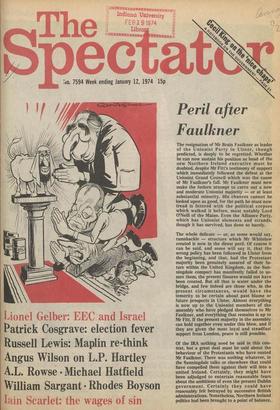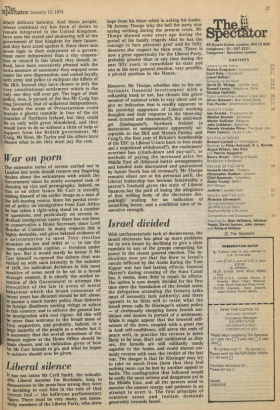Peril after Faulkner
The resignation of Mr Brain Faulkner as leader of the Unionist Party in Ulster, though predicted, is deeply to be regretted. Whether he can now sustain his position as head of the new Northern Ireland executive must be doubted, despite Mr Fitt's testimony of support which immediately followed the defeat at the Unionist Grand Council which was the cause of Mr Faulkner's fall. Mr Faulkner must now make the forlorn attempt to carve out a new and moderate Unionist majority — or at least substantial minority. His chances cannot be looked upon as good, for the path he must now tread is littered with the political corpses which walked it before, most notably Lord O'Neill of the Maine. Even the Alliance Party, which has Unionist elements and strands, though it has survived, has done so barely.
The whole delicate — or, as some would say, ramshackle — structure which Mr Whitelaw created is now in the direst peril. Of course it can be said, and some will say it, that the wrong policy has been followed in Ulster from the beginning, and that, had the Protestant majority been genuinely assured of their future within the United Kingdom, as the Sunningdale compact has manifestly failed to assure them, the present fissures would not have been created. But all that is water under the bridge, and few indeed are those who, in the present circumstances, would have the temerity to be certain about past blame or future prospects in Ulster. Almost everything is now up to the Unionist members of the assembly who have pledged themselves to Mr Faulkner, and everything that remains is up to Mr Fitt. If the present majority in the assembly can hold together even under this blow, and if they are given the most loyal and steadfast support from London, peace is still possible.
Of the IRA nothing need be said in this context, but a great deal must be said about the behaviour of the Protestants who have ousted Mr Faulkner. There was nothing whatever, in the Sunningdale talks or elsewhere that could have compelled them against their will into a united Ireland. Certainly, they might have been adjudged to entertain reasonable fears about the ambitions of even the present Dublin government. Certainly they could have reasonably felt betrayed by successive British administrations. Nonetheless, Northern Ireland politics had been brought to a point of balance, albeit delicate balance. And these people, whose continual cry has been of desire to remain integrated in the United Kingdom, have seen the stated and unaltering will of the government of that kingdom for their future, and they have acted against it. Since there was never logic to their enjoyment of a government more independent than a city corporation or council in this island, they should, indeed, have been excessively pleased with the extra measure of autonomy they enjoyed even under the new dispensation, and united loyally With army and police to extirpate the killers of the IRA. Instead they have chosen to defy the very constitutional settlement which is the only one they will ever get. The logic of their Policy, now, is pursuit of the line Mr Craig has long favoured, that of unilateral independence. No doubt the arms of Protestantism could sustain a ghetto republic in four of the six counties of Northern Ireland, but they could do so only with great bloodshed; and they Would have to do so without a tittle of help or support from the British government. Mr Craig, Mr West, Mr Taylor and the others have Chosen what to do: they must pay the cost.



































